
FRUSTRATING FILMOGRAPHIES
page 2
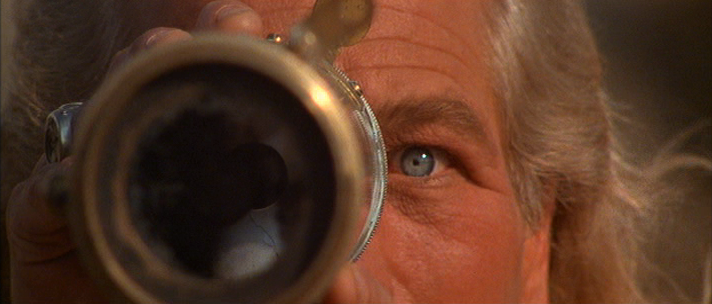
Buffalo Bill could just as easily be considered a Frustrating Film on the filmography of Paul Newman, whose iconic presence made him an auteur among actors. His best films were helmed by expert journeymen like Robert Rossen (The Hustler), Martin Ritt (Hud), Mark Robson (The Prize), Jack Smight (Harper), Stuart Rosenberg (Cool Hand Luke) and George Roy Hill (Butch Cassidy, The Sting, Slap Shot) and are defined more by Newman's signature on the project than that of their modest filmmakers who were generous and smart enough to allow the films to hang on what Newman brought to the table. Some of his worst films were made by heavy hitters like Otto Preminger (Exodus) and Hitchcock (Torn Curtain), directors who tried to apply Newman to their stylistic sensilibities rather than the other way around (the actor had better luck later in his career with Sidney Lumet and The Verdict, winning an Oscar with Scorsese, and giving one of his funniest performances for the Coens, although Hudsucker Proxy is popularly considered a failure.) But at the same time, there was a humbleness to Newman's persona that set him apart from the aggressive, self-applied "artist" tag of a thespian superstar like Warren Beatty. Beatty's assumed importance worked well playing the role of a king among miners who finds he can't compete with real world rollers and shakers in McCabe, and he probably would have been a more suitable Bill Cody had he been able to keep his vanity in check long enough to acceptthat he'd be sending up the image of "the star."
For Newman, it's an awkward fit from the start - not because it's an unglamorous part. One of if not his best role ever was Reggie Dunlap in Slap Shot,* a movie that sold itself by sending up his agreeable image with the tagline "You'll see Paul Newman doing things you'd never expect him to do... saying things you'd never expect him to say!" It's because Newman is one of the worst possible people Altman could have chosen as an example of a spoiled star (although you have to admit, the large caricature of Cody** looks a lot like the illustration of the actor on those Newman's Own jars.) Newman had already done a few irreverent westerns (Butch Cassidy, The Life and Times of Judge Roy Bean), but was just too believable a personality to play someone with trick guns to help him seem the marksman, with a phoney background as a tracker that gets embellished to the point that people confuse the dignity with "master gunfighter" and "champion Indian fighter," a man offended at being off-handedly referred to as "a mere impersonation of a patriot" who spouts unconvincing lines like, "Us whites are smart enough to know an injun always turns down the first offer!" Just the fact that he's the undisputed star of the movie conflicts with Altman's typical structure. Buffalo Bill has 26 major parts, two up from Nashville, but is centered around Newman. There's a reason for there not being any huge A-listers in the cast of Nashville, A Wedding, HealtH or even something later like Short Cuts or Gosford Park: it's impossible not to focus on the biggest star (hence Julia Roberts' incredibly distracting presence in Prêt-à-Porter; see Appendix for my attempt to categorize Altman's movies by the structure of his casts.) There's a contradiction in Altman trying to take away Newman's star power even while recognizing his celebrity: Cody is a foolish, conceited, talentless star surrounded by a pandering entourage, but he still seems important.
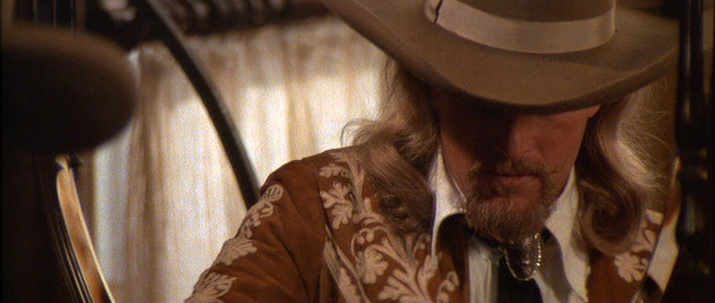
The self-delusion and hypocrisy of Altman's Bill Cody - of Altman's America - aren't successful in and of themselves, but they do supply the film the hint of an underrated Altman trait: the theme of "what is real?" Prevalent in movies like Images and 3 Women (the female psyche was clearly a mystery for Altman and made his exploration of it more interesting) are the characters delving into the charade of the world around them, ultimately finding that, in a parallel to the artificiality of the film itself, things they thought were dangerous are actually completely safe with no cause for alarm...and the other way around. The setting of Buffalo Bill provides an absurd scenario: an articifical Wild West Show performing while the Wild West was technically still in existence. Cowboys and Indians race around the stage, but while the program promises authenticity the guns are loaded with blanks and the indians are played by black men. Rumors of real world threats are summarily denounced. The real Sitting Bull is hardly a menacing warrior - he's tiny like Yoda. When he raises a gun to Grover Cleveland, everyone freaks out until they realize he's just "making the horse dance" by firing a shot off in the air. Geraldine Chaplin's crackshot Annie Oakley is like her Opal from Nashville, they're both phonies using fake/stage names. Even Cody's gun is loaded with buckshot so he can't miss the targets thrown up in front of him, a deceit revealed by Sitting Bull much to Bill's humiliation. But the very environment still portends danger: the ultimate reality v.s. fantasy confrontation comes when Annie accidentally shoots her husband Frank in the arm during a demonstration and both carry on like nothing happened to appease the audience. The movie ends with the symbolic act of "scalping" Sitting Bull, who has already met his real life fate off-screen. This diverting aspect of the film almost trumps the broad satire...until Altman makes the same mistake by spelling out his intentions.
A visual favorite of the director, especially in his examinations of reality listed above, is his conflicted/confused protagonist gazing introspectively into a mirror. Not only does Cody have two scenes where he stares down his reflection, Burt Lancaster's Ned Buntline actually has a line about it to juxtapose with a later shot ("Stars spend so much time in front of mirrors, to see if their good looks can overcome their judgment.") It's just a reminder that Altman sees himself akin to Lancaster's Buntline, sitting alone smugly in the bar removed from the main action, the only one with a sense of truth and perspective over the events playing out around him, drawing the ire of the blissfully ignorant. But like Buntline (whose name in this movie should be Bluntline), Altman undermines the film's themes by outright stating them through the dialogue. "Buffalo Bill - it's been the thrill of my life to have invented you," Buntline tells Cody before riding his horse into the darkness; the haughtiness of this send-off could come from the director, pleased with himself for crafting a film to knock Buffalo Bill off his podium, proud to pontificate by unmasking all the fakery and tell off these idiots who buy into the malarkey they read in history books before, like Buntline, riding off, jumping a fence into the darkness and obscurity of his own self-satisfaction.
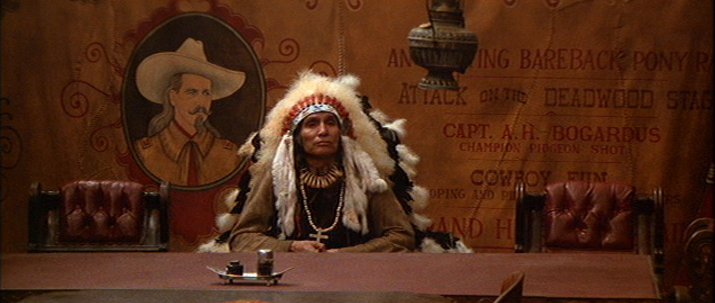
If Altman could have made the Indians more sympathetic, rather than making them cryptic and self-righteous (when Cody confines to his producer "I think I gave back the same kind of murky logic he offered me" after making a poetic statement to Sitting Bull, it's one of the movie's rare funny moments), Buffalo Bill might have been better. But again it's not about the little guy, it's not really about how we all sell out in little moments like some of the subplots in Nashville, and it's not a sympathetic tale of the struggle between free enterprise and corporation like McCabe. More than any of his films, Buffalo Bill is like The Player - it's practically a dress rehearsal for the director's 1992 critical darling of a comeback. Quick, which movie is this line from: "No ordinary man would realize what huge profits could be made by telling a pack of lies like it was the truth"? That could describe Newman's Cody or Robbins' Griffin Mill, unscrupulous showmen and exploitive entrepreneurs with delusions of importance beyond the superficial. Both are limp charlatans surrounded by spineless yes men who use their power to crush weakier yet morally stronger men who both end up dead, chiefly out of fear that the true nature of their triviality will be exposed. The way the Buffalo Bill cast is credited in the opening, by title rather than character name - The Producer, The Publicist - you can see "The Player" fitting right in there. Bill and Player are about the phoniness of show business, not exactly deep but Bill at least works better at exploring that angle than it does examing and criticizing history. Bill condemns the events of the past as if Altman were any more removed from the legacy of white America than the film industry satirized in The Player, but covers his bases in both films with bookends that acknowledge that the movie itself is a manufactured product, winks intended to say "I'm not with these guys" and, simultaneously, "I'm just messing around." The opening crane shot of The Player demonstrates Altman's natural artistry while also making a statement about its "show-offy movieness" echoed in the final scene where Tim Robbins considers making a movie called The Player. Buffalo Bill also incorporates framing devise fakeries, the first an assault by warring, whooping Indians on a farmhouse straight out of any generic western that turns out to be rehearsal for the Wild West show, a reflection on reality and show business and a chance for Altman to quip "Any asshole can make a boring western, but now watch and see MY take on it!" The last - a repetition of the first - is Cody's hokey, staged "triumph" over "Sitting Bull," who has already been murdered in real life and is played onstage by Halsey (Bull's former right hand man, a more intimidating-looking and therefore crowd-accepted evil redskin.) This phony "happy ending" of Buffalo Bill defeating his enemy is exactly like Player's parody of a happy Hollywood ending, with the added connection of Will Sampson's Halsey selling out similar to the producers of Habeas Corpus(although it's implied that he's doing it for more noble reasons - to help the starving tribe without the benefit of celebrity that his fallen leader had to fall back on.)
Like the Habeas Corpus duo, the Indians are presented as too noble and self-assured, nearly to the point of mockery. Interestingly, in both films, the one person who maintains their integrity throughout the movie is a woman - Annie Oakley in Bill, Cynthia Stevenson's jilted story editor in The Player - and both are humiliated in ways that come off as cynical character bullying by the director. They seem like characters we should side with, so why does Altman clearly detest them? Aren't these the people we used to root for in Altman movies? And while we're asking question, an even more pertinent one than "why did people praise Nashville and hate Buffalo Bill?" is "how come Buffalo Bill didn't work for people and The Player did?" What changed between 1976 and 1992? My guess would be that, although both are easy targets, it's easier for people to enjoy mocking a selective clique they're detached from and think should taken down a peg like, say, Hollywood executives rather than something they feel somewhat complicit in at some level such as the eradication of Native Americans. Or maybe Altman just enjoyed such retrospective honor by an American cinema revitalized by smaller, independent movies in the early 90's that anything harking back to a time when he wasn't shilling unimaginative stage adaptations to a disinterested public was instantly canonized. That's the whole trick: it's what audiences want from Altman. When Buffalo Bill didn't work, he tried something different. The Fox films bombed, which led him to try something safer: theatrical adaptations. But returning to what didn't work before suddenly did work for him, and led to his comeback.
In the intro to her Images review, Kael pointed to the fact that Altman was "almost frighteningly nonrepetitive." That ended with Buffalo Bill, a film that brought back the M*A*S*H loudspeakers in the form of Joel Grey announcing the acts through a primitive megaphone, made the "people talking at a gathering" an official go-to Altman device and re-stated, in less interesting fashion, the director's irreverence to something Americans were proud of. Altman cried studio interference on Buffalo Bill, explaining at the time that it was overly explicit rather than implicit because, "Well, I don't know. I really don't. There was a lot of struggling going on between Dino and myself all that time. I was trying to accommodate him and still serve the film." This alleged tension between Altman and his producers would lead to him shooting Quintet far away from the studio (he'd try the trick again by shooting Popeye in Malta; anyone who blames Altman's failings on his paranoia over studio interference can pinpoint these, arguably his two most hated films, as proof), the first of several ways Altman's method changed based on his experience on Buffalo Bill. The ensuing Fox Five would be much more experimental; anything to get away from the conventional structure that critics deemed too safe for a filmmaker who should be taking risks. Admirers have since found ways to defend the movie, mainly blaming its failure on the fledging western genre of the late 70's that culminated with Heaven's Gate, thus fulfilling the prophecy set in place by Altman himself, who just before the film's release stated, "I think it's probably the best film I've made...I think that this film will get picked up. It isn't going to be successful I don't think. But I think it'll get picked up in a couple of years, and it'll be looked back on."
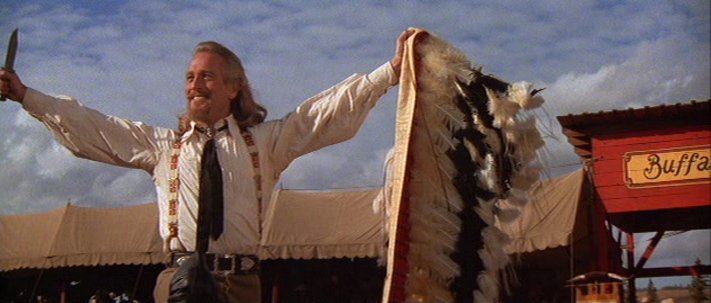
The subject: Robert Altman
The movie: Quintet
Essex: Do I misunderstand the word 'killing?'
Grigor: Not if you understand Quintet.
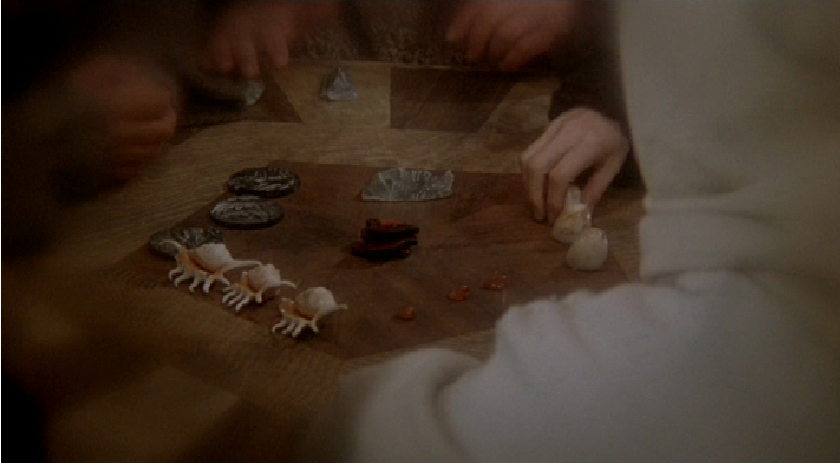
Despite its best efforts, I think I understand Quintet fairly well - enough to see why it didn't make a "killing" at the box office. Altman and Newman had failed traveling back to the past, so they looked to succeed by heading into the future: a future where people do nothing but play an abstractly-designed board game. In fact, there are several scenes of characters playing an abstractly-designed board game, whiling away the hours in the dilapidated remains of a city in the middle of a frozen, post-apocalyptic tundra. The film that anyone who hasn't recently seen O.C. & Stiggs considers Altman's worst movie, Quintet appears almost tailor-made to turn off an audience. Between its oft-described "glacial" pacing and combination blaring white and muted gray cinematography seemingly designed to put to sleep anyone who makes the mistake of looking at the screen, it's as demanding visually as it is narratively obstinate. It's as if Altman was practically daring critics to find something in the movie to defend, but unlike Buffalo Bill there are no tropes to point to: even retrospection has not endeared it to viewers (just check out the A.V. Club's Altman Primer, in which they have good things to say about every major movie BUT Quintet - they even look to salvage HealtH and Prêt-à-Porter by pointing out their respective "fleeting moments" and call the terrible Dr. T and the Women "full of life and imagination, and funny to boot.") Gaudy, grandiloquent, underplayed, overstated, nihilistic, anti-climatic...if Buffalo Bill & the Indians was a miss for the director, Quintet was a disaster.
But it's not exactly a failure: although he deemed it "passionless," Vincent Canby was at least willing to admit that Altman ended up with the movie he set out to make. Buffalo Bill had failed at what it set out to do by utilizing the director's most recognizable tools, and Quintet is almost a "fuck you, here's an effortless exercise in lethargy and lugubriosity...next time you decide you don't want a fun Altman romp, just remember this movie!" Altman was, perhaps defensively, developing a pattern of going from Altman-esque comedy to self-indulgent art film. Just as 3 Women was a quiet artist's retreat after the epic debacle of Buffalo Bill, the humorless Quintet, free of any hint of irony, seems a conscious 180 from the bawdy excess of A Wedding. And since Altman is terrible at broad comedy, Quintet's lack of humor is almost a good thing. The movie's prevailing abstraction is the exact opposite of Buffalo Bill's force-fed commentary and it's a relief that the film opens, like Images, with an arty yet subtle title card without the boisterous, clever in-joke of Nashville's introduction with the credits laid out like an ad for a record, or Buffalo Bill's fanfare brochure tauting "Robert Altman's Absolutely Unique and Heroic Enterprise of Inimitable Lustrel!" (these gimmick titles got stale pretty quickly after the fun "cast read over the loudspeaker" end credits from M*A*S*H.)
This was the third of the five Fox films, and each seemed to surgically deconstruct one successful aspect of Nashville and reuse it: hopefuls and hangers-on populate 3 Women, the gigantic cast and awkwark "comedy" practically suffocated A Wedding, the running musical acts were reworked in A Perfect Couple and the politics/satire revisited in HealtH. Quintet didn't pick at Nashville the way the other movies did, like a pack of hungry dogs feeding on dead bodies in the snow, but it arguably borrowed some of its better qualities. There's the theme of losing a family member, with Newman suffering the loss of his companion just like Keenan Wynn (this also informed the best subplot of Short Cuts, the death of Bruce Davison and Andie MacDowell's son and the harassment of Lyle Lovett's local baker in the wake of the tragedy). While Quintet's political agenda is surprisingly simple (you'd think a dystopian society would be a concept Altman would want to play around with), the invisible hand that manipulates the bottom "players" stands in for the Michael Murphy character collecting singers for the Walker rally. But for the most part Quintet was as stylistically far away from what was becoming known as a typical Altman movie as the production was physically from its financial backers. The actual setting of the story is never revealed: since the entire world is assumed to be frozen, it could be taking place anywhere on the globe, not necessarily Altman's home country that had been the boundless aim of his most recent satire. Since it's an original screenplay, the film isn't informed by its source material (The Long Goodbye, Thieves Like Us) or historical events (Buffalo Bill). Altman was artistically adrift and it's reflected in the film itself, with a murky plot that never takes time out to explain exactly what's going on and leaves a lot for the audience to determine for themselves. It doesn't hang low and hit you over the head like Buffalo Bill; quite the opposite, the movie is an impossibly high, unreachable ceiling. But should Quintet be let off the hook simply for not being ambitious or milking any kind of obvious satire?
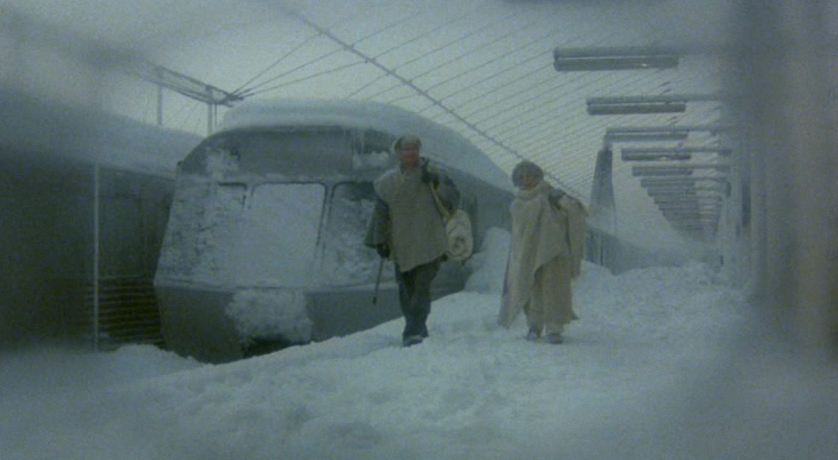
Popular science fiction B-movies had run their course by 1968, when two films by notable directors determined Hollywood's two different approaches to the genre for the next decade. Stanley Kubrick and Arthur C. Clarke's 2001 - high-minded, slow-moving, visually-explorative - convinced other filmmakers that literary sci fi could be successfully transposed to the big screen. Meanwhile, Roger Vadim and Terry Southern's Barberella - gleefully pulpy, knowingly campy and thoroughly unpretentious - embraced the escapism of fantasy fiction without setting its goals any further than scoring with the horny nerd crowd. In the 70's, auteurs obviously preferred the more contemplative, literary road of A Clockwork Orange or The Man Who Fell to Earth while even some of Paul Newman's old, less-showy directors tried their hand at bringing literary sci fi to the screen (George Roy Hill with Slaughterhouse Five, Jack Smight with The Illustrated Man and Damnation Alley). Everyone in Hollywood was reading Borges' application of Zeno's paradoxes to the work of Franz Kafka and figured themselves learned experts in literary science fiction, so each film had nothing less ambitious in mind than the intention to Examine Man. Protagonists were set apart from society, either in defiance of some futuristic oppression (Logan's Run) or disillusionment with universally-accepted dehumanization (Rollerball), and there was usually a heavy dose of religious symbolism thrown into the mix (The Omega Man). This humorless bid at importance guaranteed that most of these kind of movies were hampered by self-indulence and pomposity, not to mention the inherent hokiness which haunted even these high-minded projects: the pitfalls of cheap sets and cheesy costumes. The most blatant example from the era is John Boorman's Zardoz (1974), its philosophical ambitions subverted by the visual image of Sean Connery wearing nothing but a red diaper and knee high boots. Zardoz was a Fox release and, like Quintet, was set in a bleak, post-apocalyptic society littered with ambivalent assassins centered around the cheery idea that death is a better alternative to life. But the studio still managed to score big with sci fi when a young director whose high-minded epic, THX-1138, had flopped earlier in the decade brought them Star Wars, the ultimate low-reaching, crowd-pleasing, serial-evoking space saga in the Barberella mode, in 1977. By 1979*** Fox had another success with Alien and was prepping Empire Strikes Back - which opens, funnily enough, on a desolate ice planet covered in snow with its lead character almost freezing to death - so Altman's crack at the genre couldn't have been viewed as anything but a risk worth taking. The studio was also taking chances on auteurs: Bernardo Bertolucci's La Luna and Werner Herzog's Nosferatu were both released in '79 with Argento's Inferno and Kurosawa's Kagemusha coming out in '80. Although Altman's last two Fox films had fumbled, his name still meant prestige that the studio was, at the time, happy to be associated with.
Perhaps aware of the Get Out of Jail Free card he held with Alan Ladd, Jr., Altman abandoned the Altman-ness of A Wedding to try something completely different (he also rushed into production, just in case the Fox brass changed their minds once A Wedding's meager earnings were announced). The director fell for the high-minded science fiction concept...and fell into the same well as those who had found themselves unable to escape the genre trappings before him. From the goofy character names - Essex, Grigor, St. Christopher, Ambrosia, Goldstar, Redstone - to the wardrobe that makes the cast look like actors from Shakespeare in the Park; Kael's dig that the movie is like "a Monty Python show played at the wrong speed" seems like a specific dig at the silly costumes. But one difference Altman deserves credit for is Quintet's disciplined structure, a departure from his recent slapdash epics: he explained to an interviewer at the time that, "Because of the game qualities of the film it has to follow a certain order."
The order is as follows: Returning to the disorganized melange of civilization he'd abandoned years before to hunt seal in the south, Essex and his pregnant companion Vivia (Brigitte Fossey, who played the little girl in Forbidden Games so she should be used to all this death and misery) find that every citizen who hasn't become a frozen popsicle treat for roving dogs is playing the hip new game Quintet. Essex is looking for a job, but is told that nobody's motivated enough to work - there's "nothing left but the game!" In this hopeless world, the game has taken over and become every form of distracting entertainment rolled into one: television, video games, any sort of time-wasting preoccupation. People even collect tschotkes that serve as game pieces, so by extension the game fills in for idle hobbies such as stamp collecting or displaying pez dispensers. All the technological furtherments supposedly made before the "icing" have been foresaken, the city is run down and nobody appears to be in charge. Everyone is amusing themselves to death, even allowing themselves to be killed because they're so busy with Quintet. No sooner has Essex located his estranged brother that his obsessed sibling insists on a game; Essex's reluctance to indulge saves his life when a grenade kills everyone gathered around the board, including Vivia. The assassin is quickly dispatched himself, leaving Essex with nothing to go on but a list of names that turns out to be a group of expert Quintet players engaged in a private tournament overseen by Grigor (Fernando Rey). At this point it becomes a revenge movie, complete with a cross-off kill list, as Essex enters a tournament of Quintet played without a board in which the people are the pieces and the goal is to wipe each other out. The players on the list, including the conflicted but ambitious expert Ambrosia (after Images and 3 Women, Altman got to indulge his Bergman obsession further by casting Bibi Andersson), with whom Essex strikes up an unlikely allegiance. Naturally, alliances turn out to be unreliable and everyone is after Newman...making him yet another science fiction hero boldly striking out against the established system.
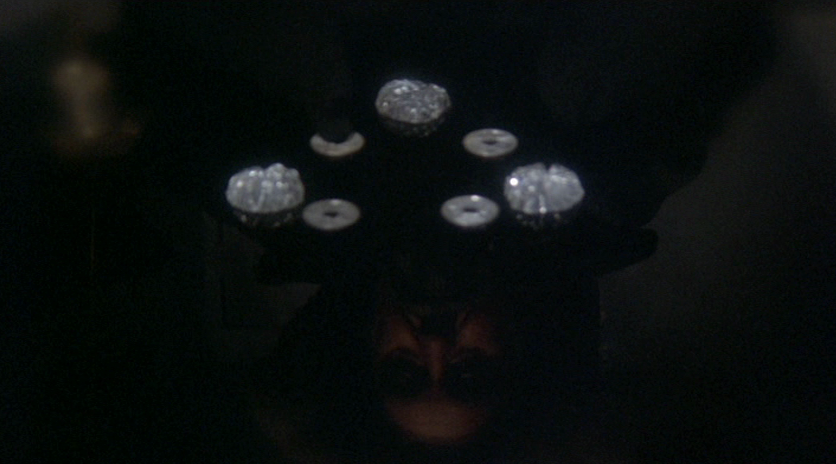
* Considering its over-lapping dialogue and the presence of Paul Dooley, it's kind of surprising that Slap Shot wasn't made by Altman; the telling difference is that the movie's set in Canada but was made in the U.S....also it's funny.
** Altman discovery Keith Carradine would go on to play Cody in Walter Hill's Wild Bill (then Wild Bill on Deadwood...he's very incestuous with his roles apparently.)
*** Other notable sci fi films from 1979 were Warner Brothers' Time After Time and the beginning of the quintessential post-apocalypse trilogy Mad Max (although it wouldn't be released in the states until the following year, redubbed by an American crew.) On the low totem was Disney's The Black Hole and James Bond's foray into space Moonraker, not to mention Paramont's dismal first attempt at a Star Trek movie.
<<Previous Page 1 2 3 Next Page>>
home about contact us featured writings years in review film productions
All rights reserved The Pink Smoke © 2012